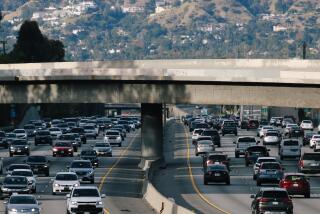Obamacare glitch may cost young smokers, spare older ones
This post has been updated, as indicated below.
The insurance reforms in the 2010 federal healthcare law (a.k.a. Obamacare) are expected to raise the price of coverage for younger, healthier Americans in order to make it more affordable for older, sicker ones. A computer glitch threatens to make that shift even more pronounced, albeit just for younger people who smoke.
The Obama administration confirmed Tuesday that a glitch in its software for evaluating insurance plans will prevent insurers from imposing as big a gap as they may have wanted between the premiums for younger and older smokers. In short, it means either older smokers will be charged less than insurers might have planned or young smokers will be charged more.
The glitch is (supposedly) temporary, and applies only to the market for individual insurance policies. And it may not affect some of the states running their own insurance exchanges, although it apparently will affect California. That’s because this state’s exchange, Covered California, is relying on the feds’ computers to check whether the premiums proposed by insurers comply with the law.
[Updated, 5:30 p.m. July 9: As it turns out, California’s reliance on the federal government’s computer system isn’t germane because Covered California previously decided not to allow insurers to charge smokers higher premiums, regardless of their age. It’s one of at least four states to bar the surcharges. That’s a win for smokers, whose risks will be spread across all those who shop at the exchange.]
To dive deeply into the weeds, the 2010 Patient Protection and Affordable Care Act allows insurers to vary their premiums in only four ways: They can charge more for family coverage than individual plans, and assess different premiums in different regions of a state. They can vary their premiums by age, but the highest age-based premiums can be no more than three times the lowest ones. And they can charge smokers up to 50% more than nonsmokers.
The law doesn’t require insurers to apply the same differential for smokers across the board. Insurers had been expected to apply a much higher differential to older smokers’ policies than younger smokers’ coverage, mainly because the latter tend to be a lot healthier than the former. As a result, the premiums for older smokers could be as much as 4.5 times what younger smokers pay.
These rules will be enforced by the federal government in at least the 33 states where Washington will be operating the local insurance exchange, along with any other state that is relying on Washington to evaluate insurers’ compliance. But the computer system the Department of Health and Human Services is using ran into some, err, computational issues that caused it to reject some proposed premiums that don’t actually violate the law.
As a result, next year insurers won’t be able to impose tobacco surcharges that push older smokers’ premiums more than three times higher than those paid by younger smokers.
“In 2015 and beyond, the system will expand to allow issuers to increase this ratio, if they choose to do so,” said HHS spokeswoman Joanne Peters. “This is a temporary circumstance that in no way impacts our ability to open the [exchanges] on Oct. 1, when millions of Americans will be able to purchase quality, affordable insurance for the first time.”
Some analysts speculated that insurers would impose smaller-than-anticipated surcharges on older smokers to keep rates low for young smokers -- a relatively healthy group that insurers are afraid will be deterred by the cost of coverage. Without young people on board to balance out the risks posed by older consumers, insurers could be stuck with spiraling medical expenses.
Others, however, predicted that insurers would react by imposing higher surcharges than planned on younger smokers, raising the premium surcharges on older smokers as well.
What they will actually do, however, remains to be seen. No matter how small a surcharge they impose on young smokers, their premiums are still going to be higher than the ones for bare-bones policies available today. They’re also going to be considerably more expensive than the tax penalty imposed for not obtaining coverage, at least in 2014.
ALSO:
Pope John Paul II and the trouble with miracles
L.A.’s broken-parking-meter scheme may soon expire
Safest seats in an air crash: They’re not where you might think
Follow Jon Healey on Twitter @jcahealey
More to Read
A cure for the common opinion
Get thought-provoking perspectives with our weekly newsletter.
You may occasionally receive promotional content from the Los Angeles Times.











